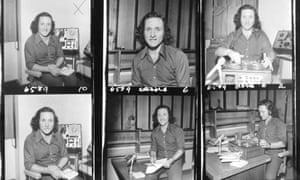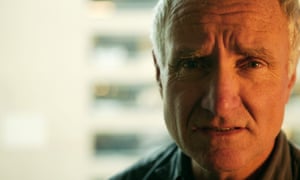Extract from The Guardian
After 40 years of fronting ABC Radio National’s
Science Show, Robyn Williams says climate science deniers have said
nothing different ‘for bloody years’

Early publicity photos of science broadcaster
Robyn Williams, courtesy of the ABC Photograph: ABC
Contact author
Monday 9 November 2015 13.10 AEDT
To say that Robyn Williams is a bit of a legend of
science broadcasting on the radio is a bit like saying David
Attenborough is a dab hand at nature documentaries on the telly.
The “legend” epithet just feels a bit
superfluous but is, in any case, annoyingly necessary to introduce a
broadcaster to those not familiar.
Williams has presented more than 2000 episodes of
The
Science Show on ABC Radio National since it was first broadcast
in August 1975.
Perhaps the only thing as synonymous with The
Science Show as Williams is the microphone he uses – a curious but
faithful lump of black plastic that he has used since first joining
the ABC in 1972 (I got to talk
down it myself once).
Last week Williams was in Brisbane for a
celebration of the 40th anniversary of the show put on by
the University of Queensland.
Williams, 71, was in conversation with ABC
personality John Doyle to an invited audience of a couple of hundred.
I was there too. Williams looks well after undergoing
treatment for cancer earlier this year.
Joining Williams onstage was outgoing chief
scientist Ian Chubb. On a big screen, there were video dedications
from the likes of actress Cate Blanchett, theoretical physicist
Professor Paul Davies, Nature editor-in-chief Philip Campbell and
former UK chief science advisor Lord May.
Oh, and David Attenborough.
But Williams reserved one section of the event to
talk about what he called “the war on science” and, in
particular, the war on climate science.
So a few days later I spoke to Williams about the
event and, in particular, that war on science he’d told people
about.
Something happened around 2006 or seven which meant that the usual politeness where you argue over ideas became, instead, a kind of assault – a propaganda assault – which most of us were not expecting.
We had not seen anything quite like that before, except when, as Naomi Oreskes has written, cigarette companies were defending their pitch.
Then it becomes obvious that you have a number of interested parties hiring experts in publicity and penetration and propaganda even to get a message across to sow doubt about science.
Not simply one aspect – like tobacco – but many aspects, as if science was a matter of opinion.
I called it the war on science because before me Sir Paul Nurse from the Royal Society had done so in his documentary for the BBC and in March the National Geographic magazine had done so on its cover story as well.
As I’ve written many times here and elsewhere,
much of the doubt
about the science linking human emissions of greenhouse gases to
dangerous climate change is manufactured.
Vested interests, either ideological or
economical, have worked hard to convince the public that sufficient
doubt exists about the causes or the impacts of climate change to
warrant doing little or nothing about it.
Investigations published earlier this year by
Inside
Climate News and later the LA
Times into one of those vested interests, oil giant Exxon, found
that the company’s own scientists were warning about the
consequences of their company’s CO2 emissions as early as the
1970s.
Exxon, later to become ExxonMobil, has long been
criticised for its funding of groups who push climate science denial.
Now ExxonMobil
along with coal giant Peabody Energy are under investigation by the
New York attorney general for allegedly misleading the public and
shareholders over the risks of climate change.
Campaigns like this are why surveys such as the
recent CSIRO
report of Australian views on climate change find that less than
half the population thinks humans cause climate change.
A study
earlier this year suggested that there were more
climate science “sceptics” in Australia than any other
advanced economy, including the US. That’s quite a feat.
Williams has interviewed probably thousands of
scientists over the years. Do they ever confide in him about the
attacks they have faced?
Very much so … and it’s not necessarily on the quiet. I did a piece in the United States with a fellow Michael Halperin from the Union of Concerned Scientists and he was talking about the virtual harassment of institutions, of universities and broadcasters exploiting the law so that you can bring them to a kind of, paralysed stop.
That is carefully organised and systematic and it is most unfortunate and many scientists have told me that. Not least of course organisations to do with climate change science itself.
Now, you don’t have to turn your radio dial all
that far in Australia to find several high-profile broadcasters
(looking at you Alan Jones et al) who will openly accuse climate
scientists of fraud and claim the entire field of climate science is
a hoax.
You can even get views like that getting a free
and unchallenged ride on Radio National now and then, such as the
interview back in May
where host Tom Switzer gave climate science denialist Lord Nigel
Lawson half an hour to dismiss climate science and attempts to
cut emissions.
ABC Radio National The Science Show presenter
Robyn Williams. Photograph: The Sydney Morning Herald/Fairfax Media
via Getty Images
So how does Williams feel when he hears denialists
doing their thing? I’ll leave you with his thoughts.
How do I feel about some person like that doing the usual encyclical? It’s what put me off broadcasting them as I used to.
Now all of the people who are deniers have been on the programs that my colleagues and I put out. We did so because most of us frankly like and enjoy contrarian views. We like a variety of opinion.
But then you find – as I did – that the people you are inviting in to give their contrarian views are always saying the same bloody thing. You can actually mouth the paragraphs. Here it comes again … just as if they were politicians rather than people considering science.
The people I put on the radio [now] have just written papers, they have published considered books. In other words, you are doing what you hope is serving the public by getting fresh ideas out to them to consider. But the people you are describing – those deniers – I have not noted saying anything new in bloody years.
Here it comes again. Favourite phrases are ... CO2 is a colourless harmless gas ... it’s good for growing plants ... and on and on it goes. It’s shameless.
If on the other hand we had really solid science that made you think twice about the standard climate concerns then on [to the radio] it goes, as it does.
But it just so happens that a lot of the science, like evolutionary theory, coheres from a zillion points of view because it’s good science that’s describing what is really there. So you will not get stuff that’s off with the pixies or where green turns into red.
When I see them going on again I think, how can people take it seriously?

No comments:
Post a Comment